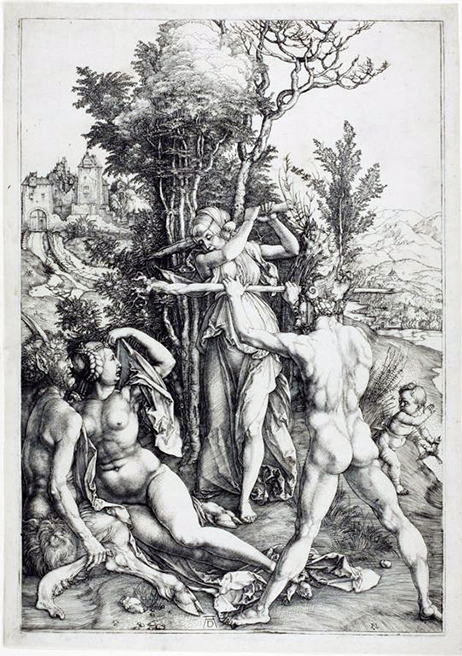Xenophon’s Memorabilia of Socrates (371BCE) tells that when Hercules was approaching manhood, he was given a choice of a life of pleasure or a life of Virtue. While sitting at a crossroads and considering his future, he is approached by two immortal women, Virtue, in a white robe, and Vice, in a transparent robe revealing her body. As each offered him a choice, they quarreled. Virtue has the last word, but tantalizingly, the story ends before Hercules makes his choice—and ever after has provided an opportunity for contrasting pleasure and Virtue, chastity and sex, and ignominy or eternal fame. Hercules and his dilemma, Virtue or Vice, have been painted, drawn, engraved, etched, dramatized, versified, novelized, and set to music.
As engraved by Albrecht Dürer, Hercules at the Crossroads [Der Hercules] (1498c.) is staged as a picnic that has been disrupted when Virtue attempts to cudgel Vice to get Hercules to choose her. As Dürer embellishes the scene, it resembles a picnic, but not quite. Virtue (a serene expression on her face) stands poised with a wood cudgel ready to deliver a terrific blow to Vice (screaming with anticipated pain), who sits on a disheveled cloth between the legs of her companion Pan. This lusty couple is perturbed because as Vice holds up her arm, Hercules ameliorates the moment with his stick held out to prevent Virtue’s attack. His choice remains unsettled; one of his legs points towards Vice and the other towards Virtue. The implication that Vice and Pan are engaged in lovemaking on the cloth suggests a sexual picnic, for which there is no sign of food or drink.
Some titles this engraving Combat of Virtue and Pleasure in the Presence of Hercules. Dürer titled it Der Hercules. Among contemporary revisions, David Ligare titles his Hercules Protecting the Balance Between Pleasure and Virtue (1993)
Featured Image: Albrecht Dürer. Hercules at the Crossroads [Der Hercules] (1498c.), engraving on paper.
See Xenophon. “The Choice of Hercules,” Memorabilia of Socrates. 2: 21-34; http://thriceholy.net/Texts/Memorabilia.html; http://library24.library.cornell.edu:8280/luna/servlet/detail/CORNELL~1~1~33809~80100021:Combat-of-Virtue-and-Pleasure-in-th; Raymond Geuss. Outside Ethics Princeton: Princeton University Press. 2009. Also, David Legare’s Hercules Protecting the Balance Between Pleasure and Virtue (1993)

